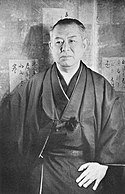Junichiro Tanizaki Quote
When I was at the University I knew a law student named Yamada Uruu. Later he worked for the Osaka Municipal Office; he’s been dead for years. This man’s father was an old-time lawyer, or advocate, who in early Meiji defended the notorious murderess Takahashi Oden. It seems he often talked to his son about Oden’s beauty. Apparently he would corner him and go on and on about her, as if deeply moved. You might call her alluring, or bewitching, he would say. I’ve never known such a fascinating woman, she’s a real vampire. When I saw her I thought I wouldn’t mind dying at the hands of a woman like that!Since I have no particular reason to keep on living, sometimes I think I would be happier if a woman like Oden turned up to kill me. Rather than endure the pain of these half-dead arms and legs of mine, maybe I could get it over and at the same time see how it feels to be brutally murdered.
When I was at the University I knew a law student named Yamada Uruu. Later he worked for the Osaka Municipal Office; he’s been dead for years. This man’s father was an old-time lawyer, or advocate, who in early Meiji defended the notorious murderess Takahashi Oden. It seems he often talked to his son about Oden’s beauty. Apparently he would corner him and go on and on about her, as if deeply moved. You might call her alluring, or bewitching, he would say. I’ve never known such a fascinating woman, she’s a real vampire. When I saw her I thought I wouldn’t mind dying at the hands of a woman like that!Since I have no particular reason to keep on living, sometimes I think I would be happier if a woman like Oden turned up to kill me. Rather than endure the pain of these half-dead arms and legs of mine, maybe I could get it over and at the same time see how it feels to be brutally murdered.
Related Quotes
About Junichiro Tanizaki
He was one of six authors on the final shortlist for the Nobel Prize in Literature in 1964, the year before his death.
